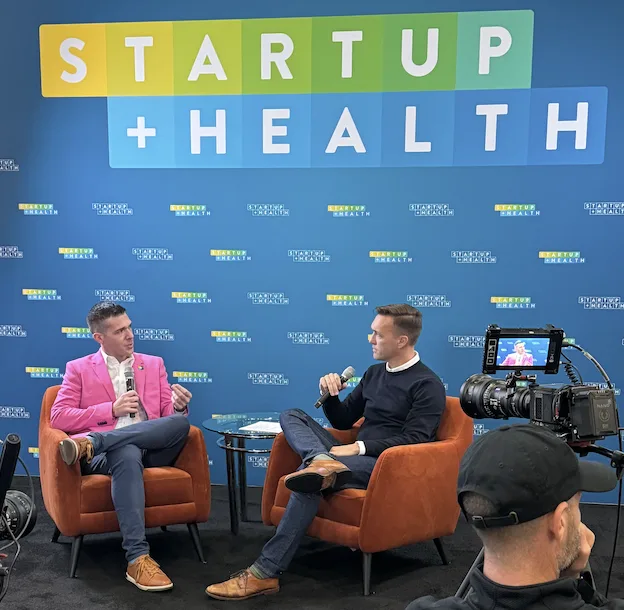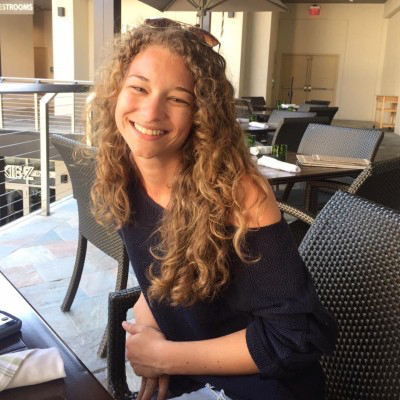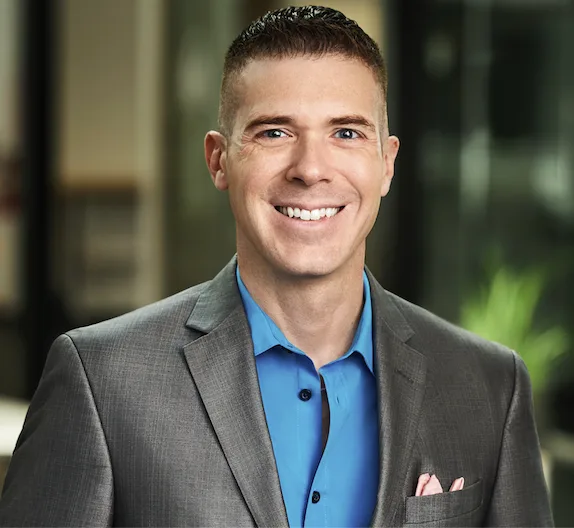“Things are only impossible until they’re not.” – Captain Picard, Star Trek, The Next Generation.
For Justin Ayars, founder and CEO of EqualityMD, this isn’t just a quote—it’s a way of life.
“[Star Trek creator Gene Roddenberry]’s dream was to see past the squabbles of humanity and show the world what a future could look like if we simply remain curious, look up, and embrace diversity,” Justin muses. “In my 16-year entrepreneurial journey, I’ve applied these life lessons—really, they’re more like philosophies—into everything I do.”
Despite his loyalties to Star Trek values, he ended up working for the “dark side” during the Great Recession. Fresh out of law school with few opportunities, he swallowed his pride and entered the corporate healthcare world as a trial lawyer.
“I hated it — every minute, but I won every case I had,” Justin bemoans, adding that when he was handed his recession pink slip, it was mostly a relief. “I didn’t feel good about the work I was doing.”
Now, that experience fuels his pride in building EqualityMD, a national inclusive telehealth and prescription fulfillment service operating entirely outside of the insurance system. Founded in 2023, it is both a passion project and practical solution amid today’s shifting healthcare policies.
“That’s what I want our community to know – that there’s an option out there,” he stresses.
In these times, Justin often reflects on another quote from Roddenberry: “It’s impossible to fear diversity and to enter the future at the same time.”
King to The Queen
Diversity defined Justin’s childhood. Born in Las Vegas, his father was a well-connected musician—touring with Elvis Presley before becoming Liberace’s right-hand man.
“My mom always said that your dad went from working with the king to working with the queen,” Justin jokes. Justin’s dad was so integral to Liberace’s success during their 13-year relationship that “Mr. Showmanship” even became the godfather of Justin and his younger brother, Evan, who’s also gay.
Looking back, Justin wishes he could revisit those lavish parties, which regularly featured guests like Barbra Streisand, Sammy Davis Jr., and the Rockettes. “But it did instill a very creative musical sense, because musicians by nature have to be entrepreneurial.”
That creative spark would soon face its first test.
The death of Liberace in 1987 left a dark cloud over the family. They decided to relocate to Washington, D.C.
“Growing up my options, according to my family, were either show business or go do covert ops,” he says. “I was the black sheep that decided to go to law school.”
But his real divergence came earlier. As a child, Justin began to question his sexuality, but didn’t come out as gay until he was 16. He admitted the revelation to his mother, who simply replied, “I’ve known for two years.”
“Mothers always know,” Justin chuckles. “It helped that her older brother, my uncle, is also gay.”
But it was his uncle who would become a driving force behind the man and entrepreneur he is today.
Chosen Family
The depth of Justin’s love and respect for his uncle can’t be overstated. This was the man who became a second father to him as a young LGBTQ kid.
He remembers the revelation coming one Christmas after his grandparents’ annual party in Virginia. His uncle told 12-year-old Justin that the night wasn’t over; they were going to a special second party.
The pair traveled to D.C., where they entered a beautiful brownstone filled with gay and bisexual men exchanged gifts over wine and laughter. Justin slowly grasped that his uncle had brought him to his first “gay Christmas.”
“It was at that moment I realized what my uncle was trying to do, and that was not letting outside influences make me feel like ‘the other,’” he ruminates. “But rather make the LGBTQ experience—in our case, gay experience—not just acceptable, but encouraged.”
Soon Justin was embraced by his uncle’s circle of friends—the men who became his “aunties.” They opened up Justin’s world—providing opportunities to access a global network of aunties and resources.
“I was able to visit places and experience what gay life was like,” he explains. “It’s not just all circuit parties and Pride parades.”
These men are why Justin believes it’s crucial to find the right advisors and mentors, particularly in the LGBTQ community, such as Stargazer Angel.
“When you realize you’re not alone, you’re able to do a lot more.”
Chasing Entrepreneurial Dreams
Despite community support, the Great Recession hit him hard. But he was far from down and out. “I’ve always had this entrepreneurial spirit,” Justin says, “I wanted to explore that.”
His drive—inherited from showbiz roots—led to him opening a tiny mall coffee shop, which became an impromptu safe space for queer youth. He eventually sold the shop to open a LGBTQ-freindly cosmopolitan lounge in Richmond.
From there, he was asked to create Richmond’s LGBT chamber and launched Q Media, where a recurring question from his community haunted him: ‘Where can I find a doctor who makes me feel safe?’

After years of hearing “horror stories” from minority patients, Justin didn’t experience the bigotry firsthand until a 2019 dermatologist visit. Sitting naked in a gown, he made a nervous joke about being gay.
“The dermatologist then said, ‘Wait, you’re a homosexual?’” Justin explains, outlining the interaction. “I said, well, clinically speaking, I guess you could say that. He took off his gloves, left the room, and said, ‘I don’t feel comfortable touching your skin.’”
Alone and stunned, the moment crystallized what others had endured. When pandemic care disparities worsened, he knew action was needed. Of EqualityMD’s founding, Justin says: “There was no one moment. Just a thousand paper cuts. They still sting, but you push through.”
Fundraising While Queer
When asked if today’s political climate makes it harder for LGBTQ founders, Justin’s answer is nuanced.
“First of all, all entrepreneurs are, by definition, certifiably insane. We take risks no one else will,” he states. “But the struggles of being an LGBTQ entrepreneur are [real], especially if you consider the intersectionality of our community.”
He believes surviving the VC world requires “the thickest skin imaginable”—something he’s earned through hard experience.
“It doesn’t matter if you’re part of a minority group or not,” Justin notes. “You can be a cis straight white guy, and still you are required to be insane to start a company.”
“As William Shatner said as Captain Kirk, ‘Risk is our business,'” he recites. “There is no guarantee, and that is where you have to really dig deep and find inner strength.”
But Justin doesn’t sugarcoat the homophobia he’s faced. Even in LGBTQ-friendly D.C., cocktail hours could turn hostile in a heartbeat.
He details how his startup would be met with backlash from some, being told things like, “Don’t you people have enough already? You have marriage equality. Why do you people need special treatment?”
This sentiment becomes a “brutal” blow when pitching to investors. “As soon as they see the letters LGBTQ+, they instantly—these are all white guys, of course—turn around, open their cellphones and act busy.”
Even those that empathize with his mission only see one thing: “Sometimes afterward, the kind-hearted people come up to me and say, ‘Why don’t you talk to your own people about raising money?'”
In the face of prejudice, Justin calls the lack of capital toward queer startups deplorable. “Some [investors] even think that because you use the letters LGBTQ, you’re automatically a nonprofit.”
Turning Bias Into Business
Justin has learned to laugh at the absurdity of it all, mastering how to make the right statement to the right people—like when he pitched EqualityMD in Long Beach.
“The demographic of the audience of about 300 was very diverse, but a lot of them fit into cultural minorities that didn’t typically want to talk about anything LGBTQ,” he shares. Knowing the odds were against him, he flipped the script to find the right investors.
His plan: Dance on stage like a clown to deliberately alienate 90% of the room.
“So I got up there and I recited some statistics, like our LGBTQ healthcare market’s valued at $216 billion from the 2021 report from PitchBook,” he recounts, adding that jeers from the crowd declared him a liar. In the end, he estimates two-thirds of the audience walked out.
“I couldn’t have been happier,” he boasts. “Those that stayed congratulated me during lunch and set up investor meetings after.”
Despite all of the discrimination, Justin stays vigilant. He believes founders should “intentionally and willingly put yourself out there and build up a tolerance to being uncomfortable.”
“As Liberace taught me, always know your audience,” Justin says with a bright smile. “I hope more LGBTQ entrepreneurs understand and actively try to make it a part of their entrepreneurial journey.”
To Boldly Go: A Star Trek Future for Healthcare
Justin has seen much of the world, coming to terms with the coexistence of good and evil within it. But he still holds hope that Roddenberry’s vision of paradise is possible outside of a screenplay.
He wants a “world united behind the idea of exploring the galaxy and discovering that life—be it on Earth or elsewhere—was full of ‘infinite diversity in infinite combinations.'”
He sums up Star Trek, and by extension his life philosophy, in two words: “Look up.”
“If we—that is, humanity—come together and collectively look up into the night sky, we can become dreamers, just like our ancestors once were. We can see how petty our differences are and realize that diversity is the foundation of strength.”

About the Author: Tess Danielson is a journalist and writer focusing on the intersection of technology and society.
Get on our radar for an investment.
Beta Boom invests in founders who don’t fit the traditional Silicon Valley mold.

